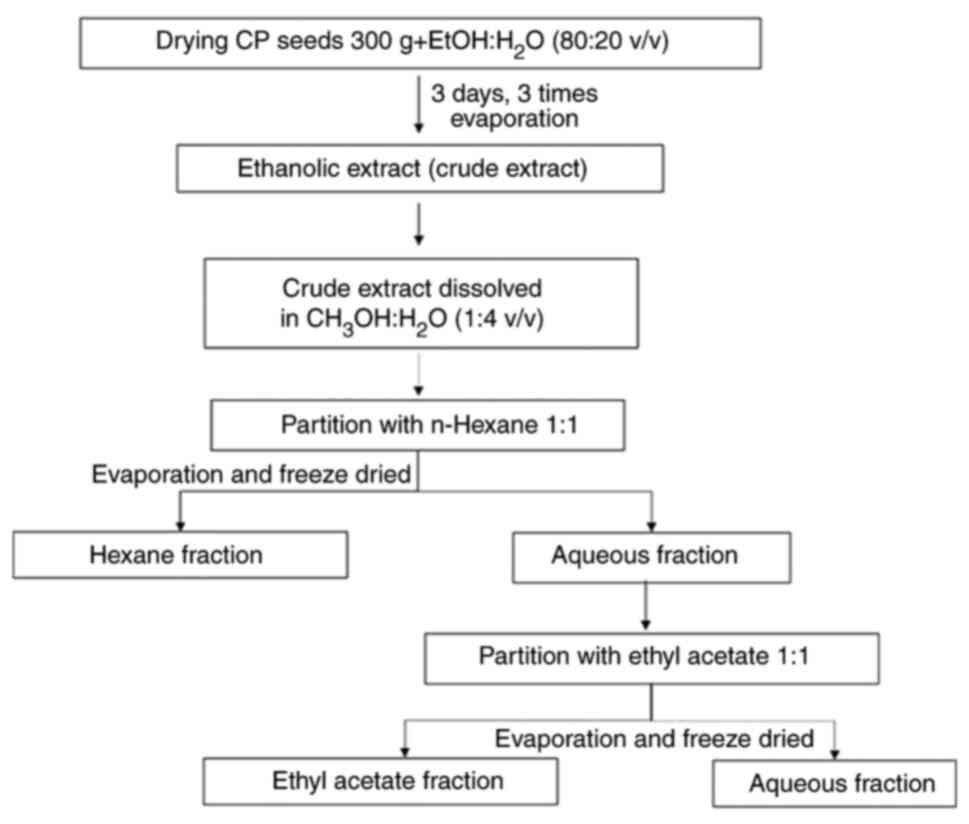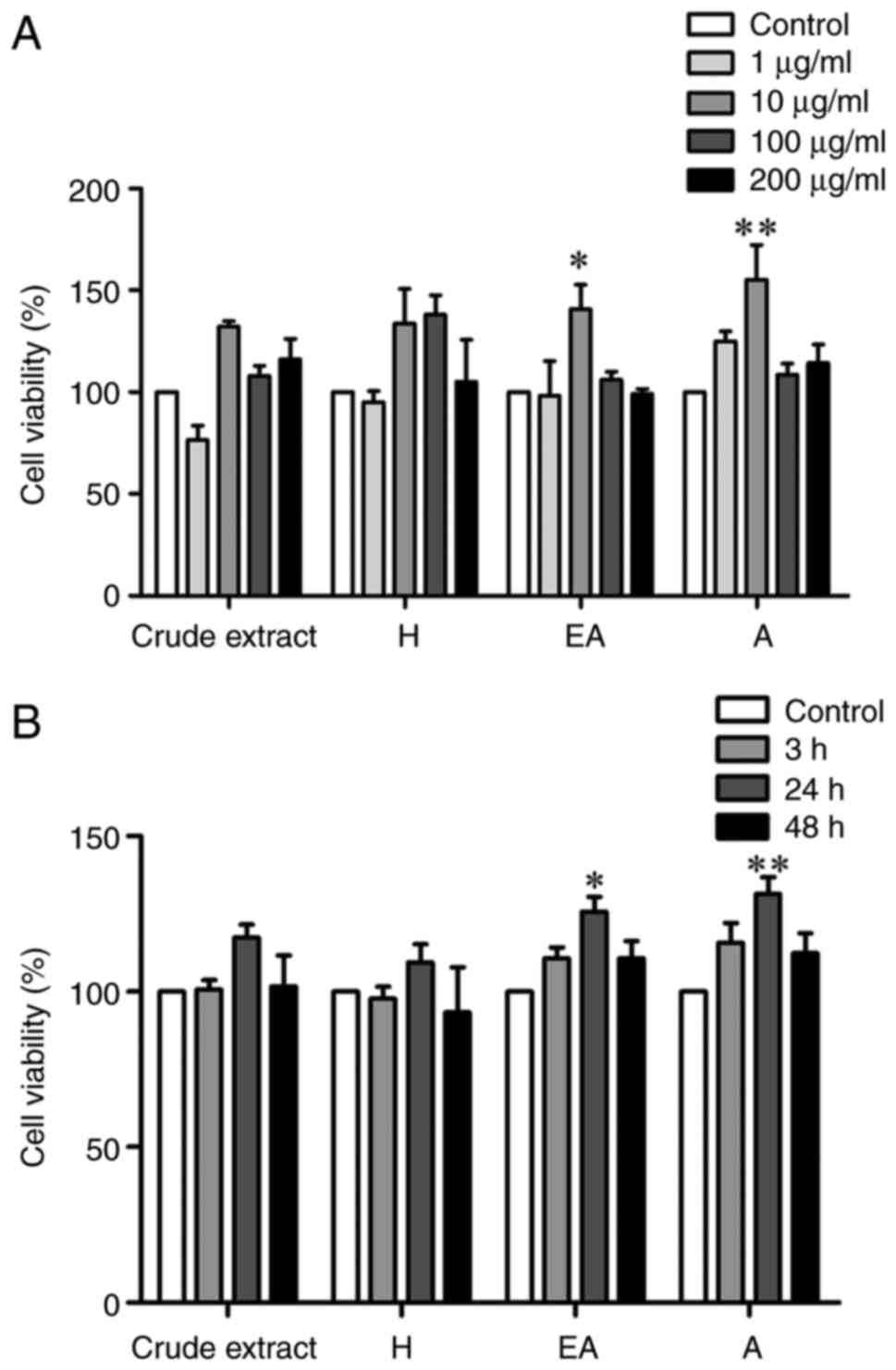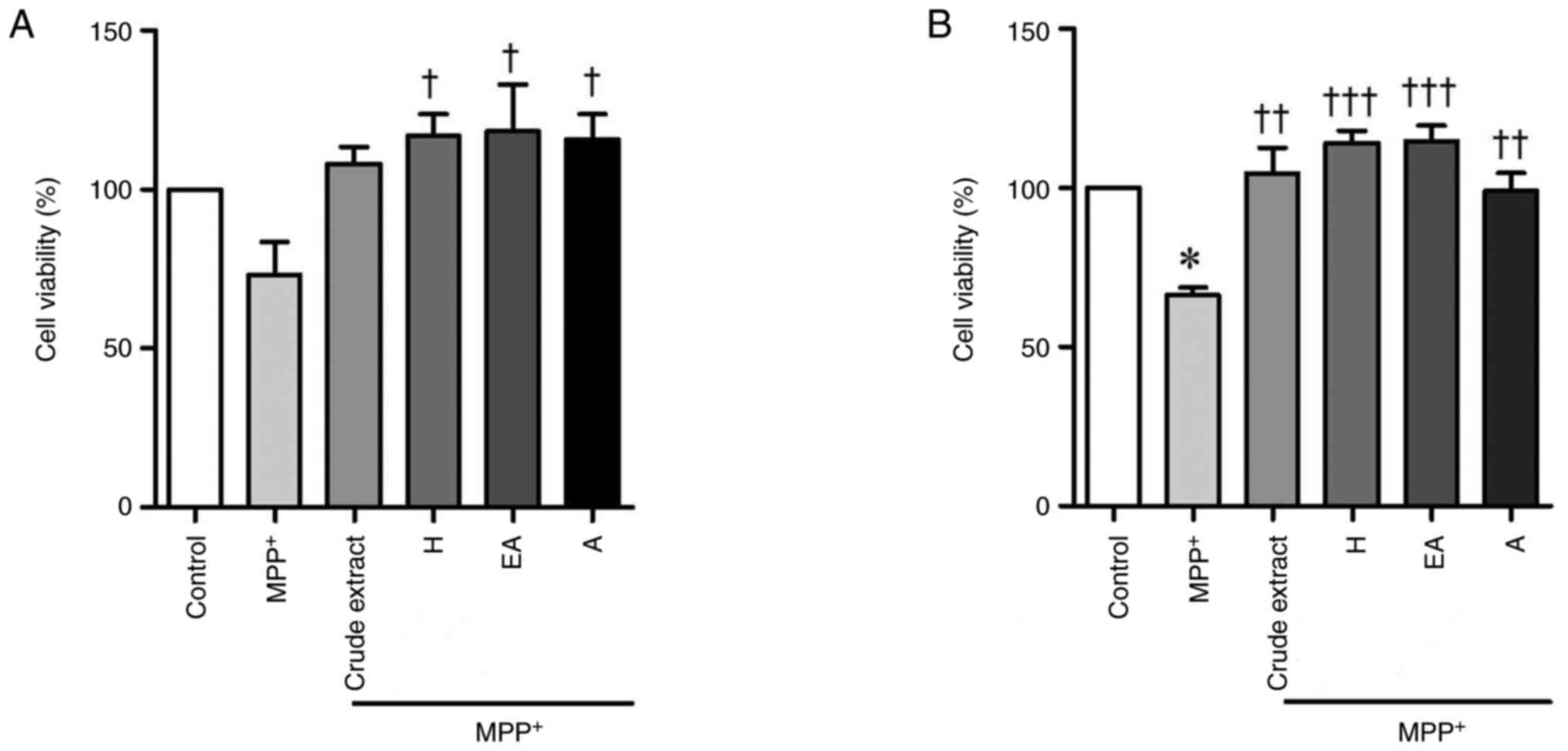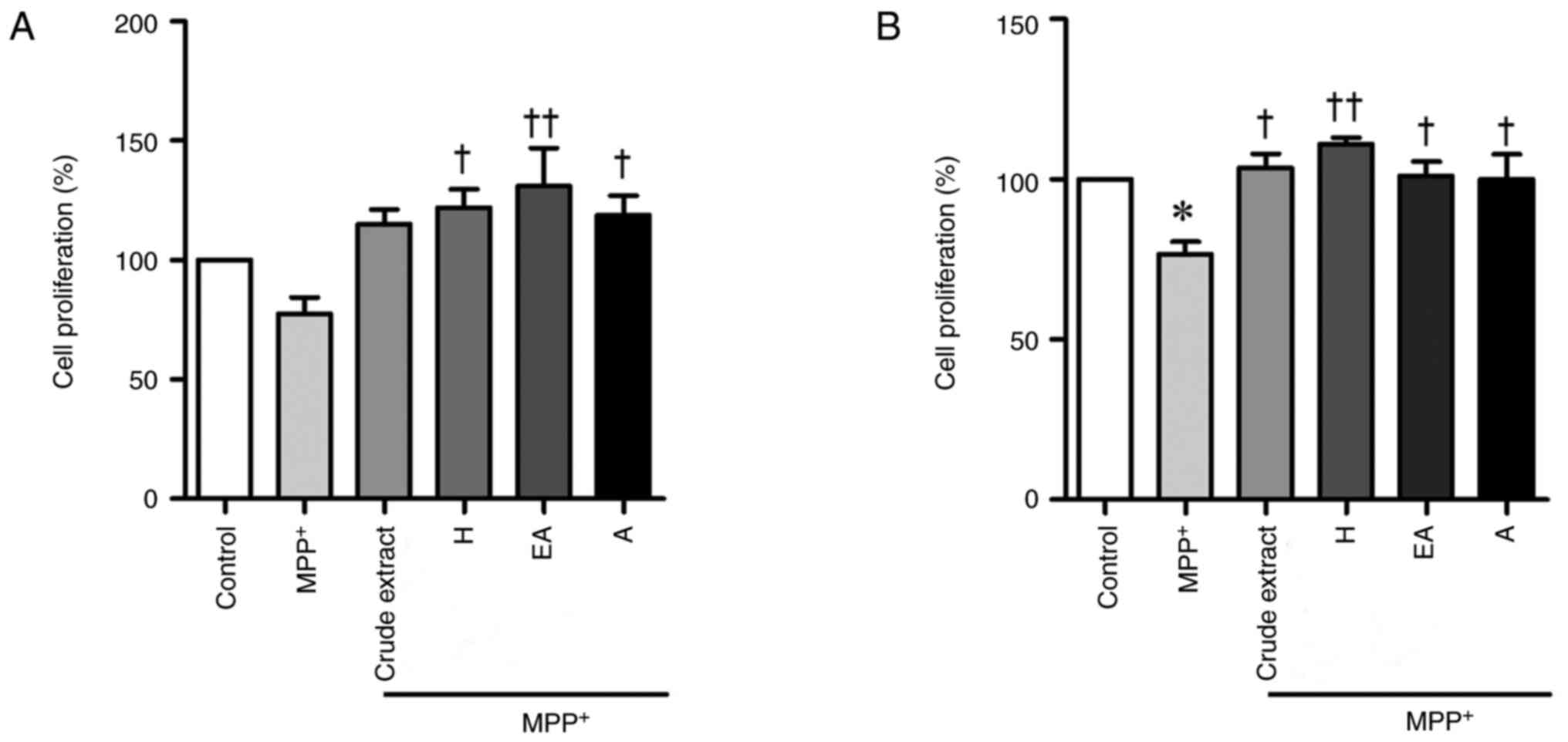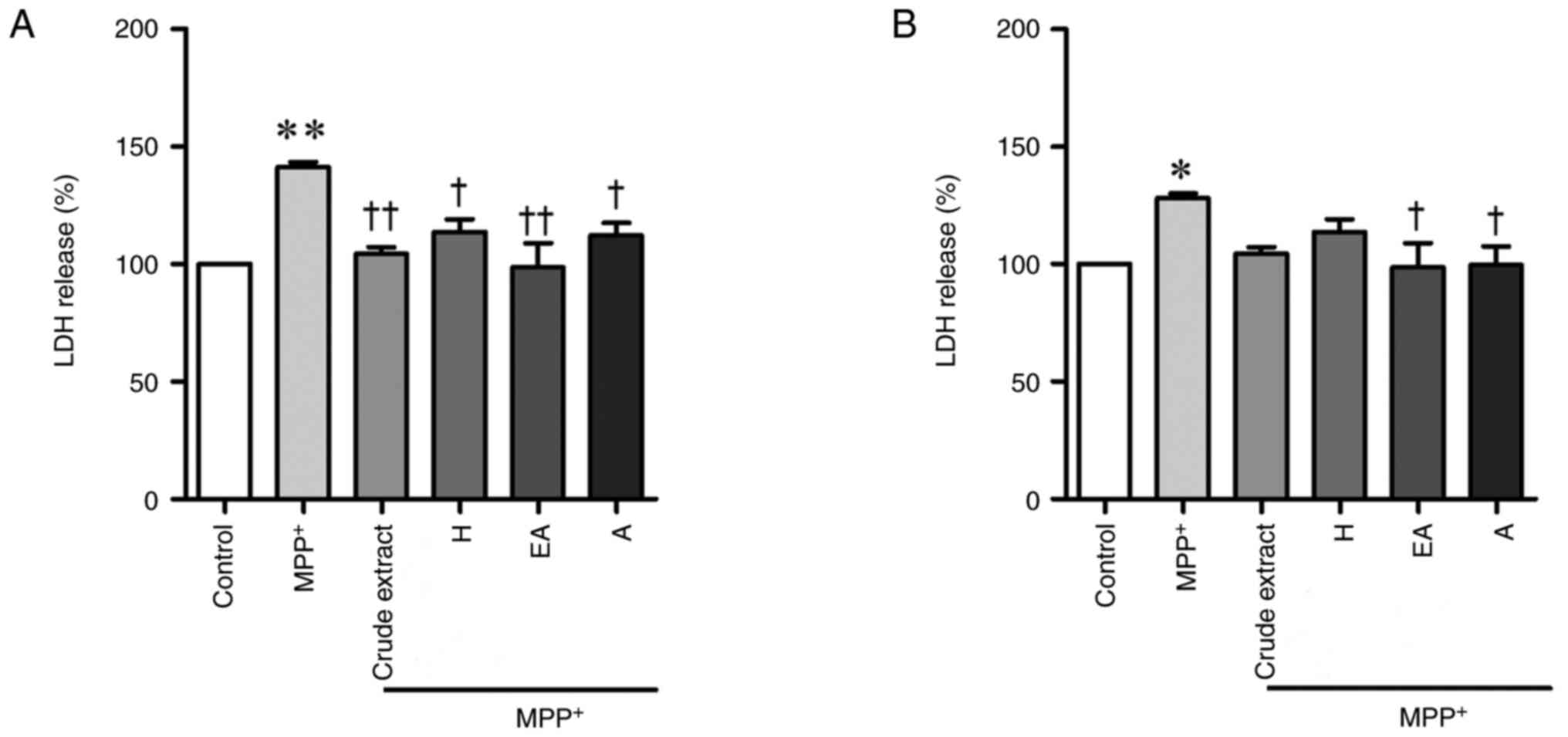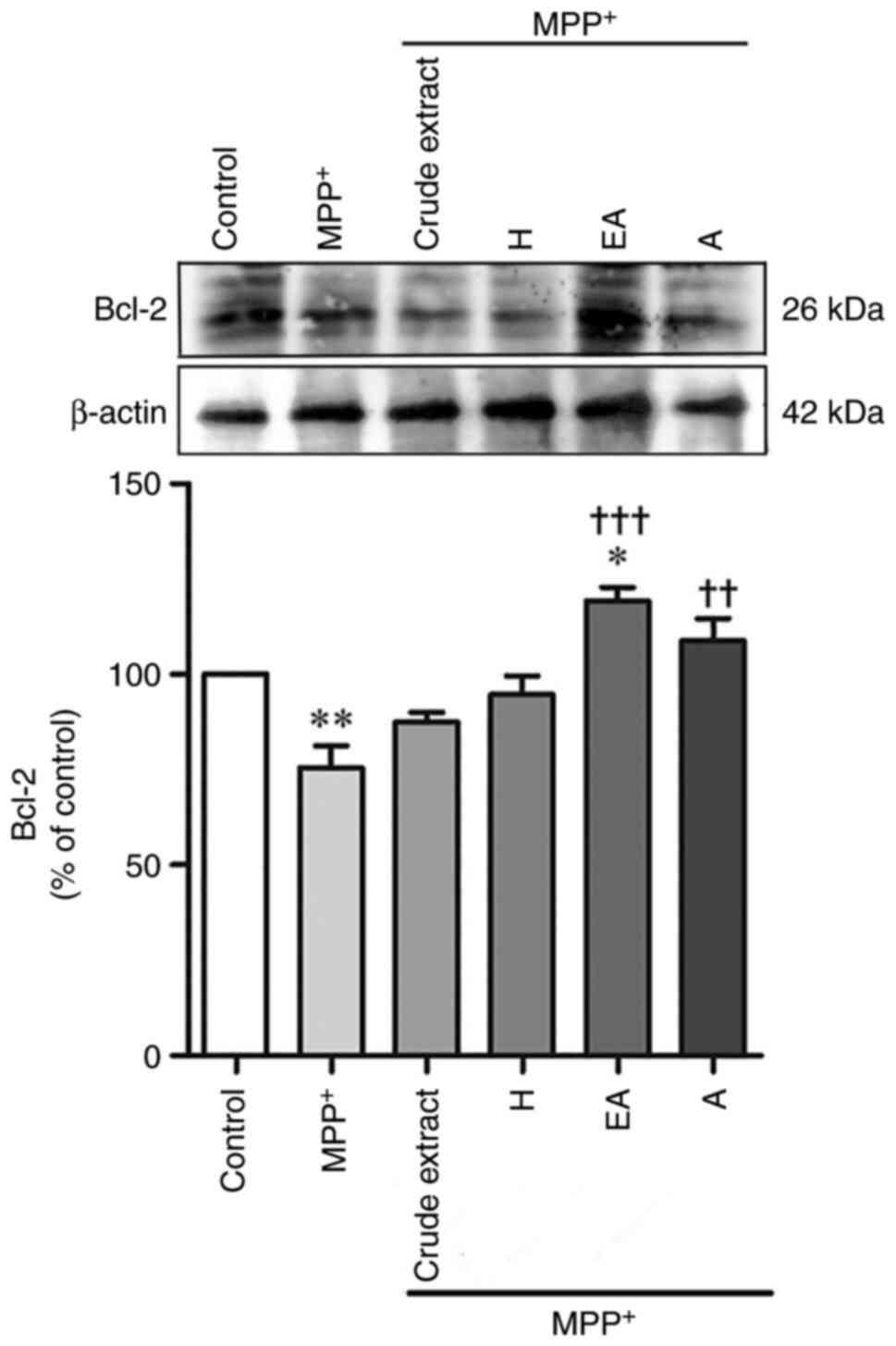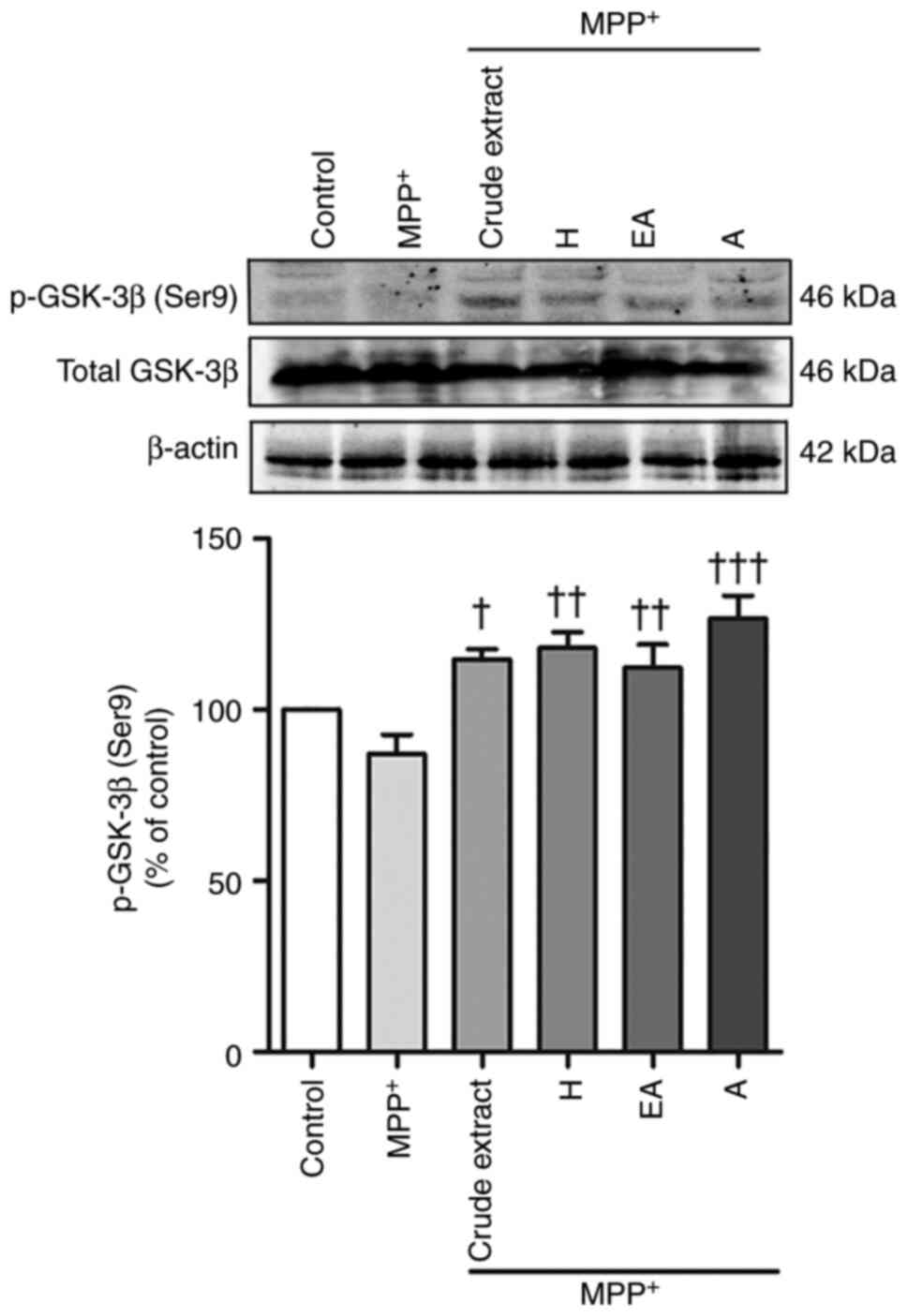|
1
|
Lin MT and Beal MF: Mitochondrial
dysfunction and oxidative stress in neurodegenerative diseases.
Nature. 443:787–795. 2006.PubMed/NCBI View Article : Google Scholar
|
|
2
|
Singer TP and Ramsay RR: Mechanism of the
neurotoxicity of MPTP. An update. FEBS Lett. 274:1–8.
1990.PubMed/NCBI View Article : Google Scholar
|
|
3
|
Enogieru AB, Haylett W, Hiss DC and Ekpo
OE: Regulation of AKT/AMPK signaling, autophagy and mitigation of
apoptosis in rutin-pretreated SH-SY5Y cells exposed to MPP. Metab
Brain Dis. 36:315–326. 2021.PubMed/NCBI View Article : Google Scholar
|
|
4
|
O'Malley KL, Liu J, Lotharius J and Holtz
W: Targeted expression of BCL-2 attenuates MPP+ but not 6-OHDA
induced cell death in dopaminergic neurons. Neurobiol Dis.
14:43–51. 2003.PubMed/NCBI View Article : Google Scholar
|
|
5
|
Li J, Ma S, Chen J, Hu K, Li Y, Zhang Z,
Su Z, Woodgett JR, Li M and Huang Q: GSK-3β contributes to
parkinsonian dopaminergic neuron death: Evidence from conditional
knockout mice and tideglusib. Front Mol Neurosci.
13(81)2020.PubMed/NCBI View Article : Google Scholar
|
|
6
|
Petit-Paitel A, Brau F, Cazareth J and
Chabry J: Involvement of cytosolic and mitochondrial GSK-3beta in
mitochondrial dysfunction and neuronal cell death of
MPTP/MPP-treated neurons. PLoS One. 4(e5491)2009.PubMed/NCBI View Article : Google Scholar
|
|
7
|
Kulkarni YA, Agarwal S and Garud MS:
Effect of Jyotishmati (Celastrus paniculatus) seeds in animal
models of pain and inflammation. J Ayurveda Integr Med. 6:82–88.
2015.PubMed/NCBI View Article : Google Scholar
|
|
8
|
Bhagya V, Christofer T and
Shankaranarayana Rao BS: Neuroprotective effect of Celastrus
paniculatus on chronic stress-induced cognitive impairment. Indian
J Pharmacol. 48:687–693. 2016.PubMed/NCBI View Article : Google Scholar
|
|
9
|
Bhanumathy M, Harish MS, Shivaprasad HN
and Sushma G: Nootropic activity of Celastrus paniculatus seed.
Pharm Biol. 48:324–327. 2010.PubMed/NCBI View Article : Google Scholar
|
|
10
|
Godkar PB, Gordon RK, Ravindran A and
Doctor BP: Celastrus paniculatus seed oil and organic extracts
attenuate hydrogen peroxide- and glutamate-induced injury in
embryonic rat forebrain neuronal cells. Phytomedicine. 13:29–36.
2006.PubMed/NCBI View Article : Google Scholar
|
|
11
|
Kumar MH and Gupta YK: Antioxidant
property of Celastrus paniculatus willd.: A possible mechanism in
enhancing cognition. Phytomedicine. 9:302–311. 2002.PubMed/NCBI View Article : Google Scholar
|
|
12
|
Russo A, Izzo AA, Cardile V, Borrelli F
and Vanella A: Indian medicinal plants as antiradicals and DNA
cleavage protectors. Phytomedicine. 8:125–132. 2001.PubMed/NCBI View Article : Google Scholar
|
|
13
|
Lekha G, Mohan K and Samy IA: Effect of
Celastrus paniculatus seed oil (Jyothismati oil) on acute and
chronic immobilization stress induced in swiss albino mice.
Pharmacogn Res. 2:169–174. 2010.PubMed/NCBI View Article : Google Scholar
|
|
14
|
Kumar KH, Venuprasad MP, Jayashree GV,
Rachitha P, Krupashree K, Pal A and Khanum F: Celastrus paniculatus
Willd. mitigates t-BHP induced oxidative and apoptotic damage in
C2C12 murine muscle cells. Cytotechnology. 67:955–967.
2015.PubMed/NCBI View Article : Google Scholar
|
|
15
|
Khongkaew P and Chaemsawang W: Development
and characterization of stingless bee propolis properties for the
development of solid lipid nanoparticles for loading lipophilic
substances. Int J Biomater. 2021(6662867)2021.PubMed/NCBI View Article : Google Scholar
|
|
16
|
John E, Mishra B, Tripathi AS and Aleesha
R: Protective effect of Celastrus paniculatus on cognitive function
in glutamate-induced brain-injured mice by reducing the
intracellular influx of Ca. Int J Dev Neurosci. 82:331–338.
2022.PubMed/NCBI View Article : Google Scholar
|
|
17
|
Godkar PB, Gordon RK, Ravindran A and
Doctor BP: Celastrus paniculatus seed water soluble extracts
protect against glutamate toxicity in neuronal cultures from rat
forebrain. J Ethnopharmacol. 93:213–219. 2004.PubMed/NCBI View Article : Google Scholar
|
|
18
|
Anjaneyulu J, R V and Godbole A:
Differential effect of ayurvedic nootropics on C. elegans models of
Parkinson's disease. J Ayurveda Integr Med. 11:440–447.
2020.PubMed/NCBI View Article : Google Scholar
|
|
19
|
Balaji K, Vijayakumar J, Sankaran PK,
Senthilkumar S, Vijayaraghavan R, Selvaraj J and Yuvaraj MF:
Molecular studies on the nephroprotective potential of Celastrus
paniculatus against lead-acetate-induced nephrotoxicity in
experimental rats: Role of the PI3K/AKT signaling pathway.
Molecules. 26(6647)2021.PubMed/NCBI View Article : Google Scholar
|
|
20
|
Martins-Noguerol R, Pérez-Ramos IM, Matías
L, Moreira X, Francisco M, García-González A, Troncoso-Ponce AM,
Thomasset B, Martínez-Force E, Moreno-Pérez AJ and Cambrollé J:
Crithmum maritimum seeds, a potential source for high-quality oil
and phenolic compounds in soils with no agronomical relevance. J
Food Compos Anal. 108(104413)2022.
|
|
21
|
Kagan IA: Soluble phenolic compounds of
perennial ryegrass (Lolium perenne L.): Potential effects on animal
performance, and challenges in determining profiles and
concentrations. Anim Feed Sci Technol. 277(114960)2021.
|
|
22
|
Chaemsawang W, Prasongchean W,
Papadopoulos KI, Ritthidej G, Sukrong S and Wattanaarsakit P: The
effect of Okra (Abelmoschus esculentus (L.) Moench) eeed extract on
human cancer cell lines delivered in its native form and loaded in
polymeric micelles. Int J Biomater. 2019(9404383)2019.PubMed/NCBI View Article : Google Scholar
|
|
23
|
Popoola OO: Phenolic compounds composition
and in vitro antioxidant activity of Nigerian Amaranthus viridis
seed as affected by autoclaving and germination. Meas Food.
6(100028)2022.
|
|
24
|
Thaipong K, Boonprakob U, Crosby K,
Cisneros-Zevallos L and Hawkins Byrne D: Comparison of ABTS, DPPH,
FRAP, and ORAC assays for estimating antioxidant activity from
guava fruit extracts. J Food Compos Anal. 19:669–675. 2006.
|
|
25
|
Aleem M: Phytochemistry and pharmacology
of Celastrus paniculatus Wild: A nootropic drug. J Complement
Integr Med. 20:24–46. 2021.PubMed/NCBI View Article : Google Scholar
|
|
26
|
Yang T, Wang S, Zheng H, Wang L, Liu D,
Chen X and Li R: Understanding dihydro-β-agarofuran sesquiterpenes
from Tripterygium hypoglaucum as the modulators of multi-drug
resistance in HepG2/Adr cells. Biochem Biophys Res Commun.
508:742–748. 2019.PubMed/NCBI View Article : Google Scholar
|
|
27
|
Weng JR, Yen MH and Lin WY: Cytotoxic
constituents from Celastrus paniculatus induce apoptosis and
autophagy in breast cancer cells. Phytochemistry. 94:211–219.
2013.PubMed/NCBI View Article : Google Scholar
|















